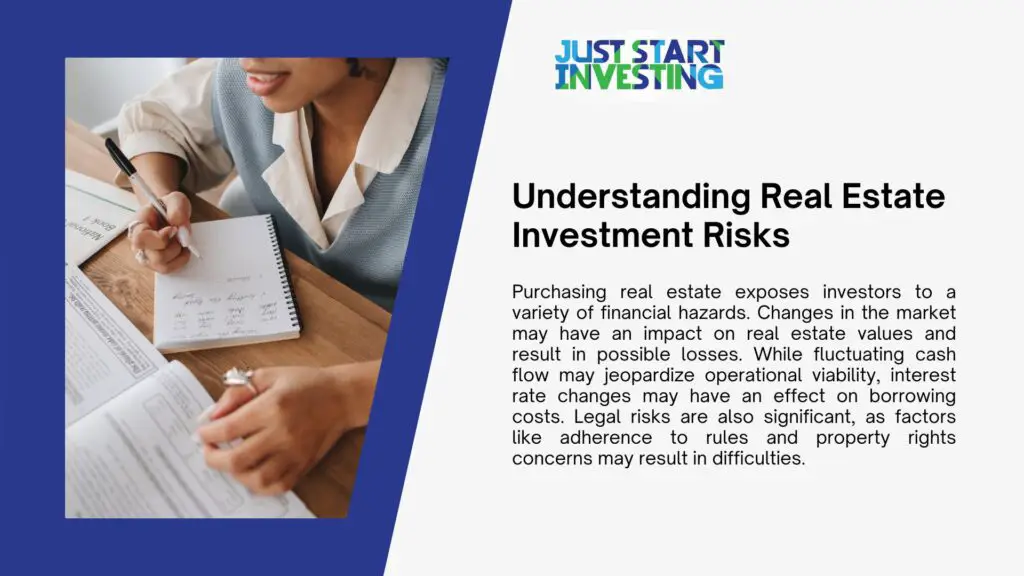Real estate is renowned for its ability to yield substantial returns, making it a reliable investment choice in the realm of wealth accumulation. Nevertheless, the appeal of real estate investing is not without its hazards. It is essential for entrepreneurs to comprehend and control these risks when they enter this field. Intentional risk mitigation techniques can help entrepreneurs increase the likelihood that their real estate investment ventures will be successful. This article seeks to provide insight into doable strategies for protecting real estate investments from a range of hazards.
Understanding Real Estate Investment Risks

Purchasing real estate exposes investors to a variety of financial hazards. Changes in the market may have an impact on real estate values and result in possible losses. While fluctuating cash flow may jeopardize operational viability, interest rate changes may have an effect on borrowing costs. Legal risks are also significant, as factors like adherence to rules and property rights concerns may result in difficulties.
Real estate investments frequently present operational difficulties. Tenant management and maintenance issues may arise from the need for resources that are beyond the means of inexperienced investors. It is also important to remember that external environmental risks, like natural disasters or unfavorable location-specific issues, can have significant financial repercussions.
Research and Due Diligence
Navigating the intricacies of real estate investment requires entrepreneurs to place a high priority on careful study and due diligence. In order to help investors find profitable opportunities, market research offers vital insights into promising areas and property types. To stay out of trouble, it’s still critical to assess the track record and financial standing of possible investments. Legal due diligence also guarantees that investments meet regulatory requirements and reduce the likelihood of legal disputes. This includes knowledge of zoning laws and property rights.
Diversification Strategies
A strong defense against risk in real estate is diversification. Entrepreneurs reduce their exposure to market-specific downturns by investing in a range of property types and geographical locations. A wider, more diversified investment portfolio that includes real estate reduces risk even more and acts as a buffer during uncertain economic times. As a result, a well-diversified portfolio contributes to stability by shielding investors from the real estate industry’s inherent volatility.
Adapting to Market Changes
Getting professional advice can greatly enhance the results of real estate investments. Attorneys, financial advisors, and real estate brokers provide entrepreneurs with invaluable insights to help them navigate complicated legal issues and transactions. Reputable property managers can help you run your business more efficiently while maintaining and renting out your properties. Furthermore, inspection services can spot possible problems with a property early on, avoiding future expensive repairs.
Financing and Capital Management
Successful real estate investing requires effective capital management and financing. When assessing different financing options, entrepreneurs should take interest rate impacts on their investment returns into account. To keep leverage under control, it’s imperative to maintain a healthy debt-to-equity ratio. Long-term financial stability is influenced by cash flow management techniques like maximizing rental income and reducing operating costs.
Insurance and Risk Transfer
Transferring risk and protecting real estate investments are two important functions of insurance. Liability and property insurance are among the many insurance types that guard against unanticipated losses. This type of coverage protects investors from monetary strain brought on by unfavorable circumstances, acting as a safety net to help maintain the investment over time. Investors are well-protected and risks are sufficiently covered when one is aware of the subtleties of insurance policies.
Adapting to Market Changes
It is essential for forward-thinking investors to be aware of changes in the market. In order to predict changes in the real estate market and make timely adjustments to investment strategies, investors can keep an eye on market and economic trends. To keep their portfolio resilient, entrepreneurs need to be ready to modify their real estate holdings in response to changes in the market. Making informed decisions with flexibility improves the ability to take advantage of opportunities while reducing risks.
With careful consideration, real estate investments, like the Elta Condo in Clementi Town, can yield significant profits. For a better understanding of these opportunities, potential investors should think about touring the Elta Condo Show flat. Since the possible benefits of properly managed real estate investments frequently exceed the difficulties, entrepreneurs are urged to put comprehensive risk mitigation strategies into place. By adopting careful investigation, diversification, expert advice, prudent financial management, insurance, and flexibility, business owners can successfully traverse the real estate investment terrain, increasing their prospects of attaining financial prosperity.

Just Start Investing is a personal finance website that makes investing easy. Learn the simple strategies to start investing today, as well as ways to optimize your credit cards, banking, and budget. Just Start Investing has been featured on Business Insider, Forbes, and US News & World Report, among other major publications for its easy-to-follow writing.
